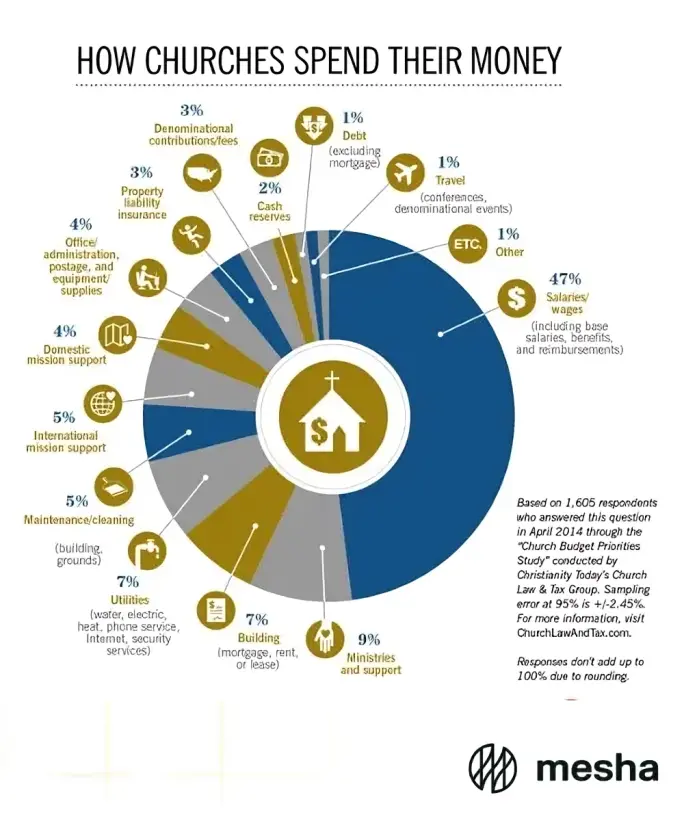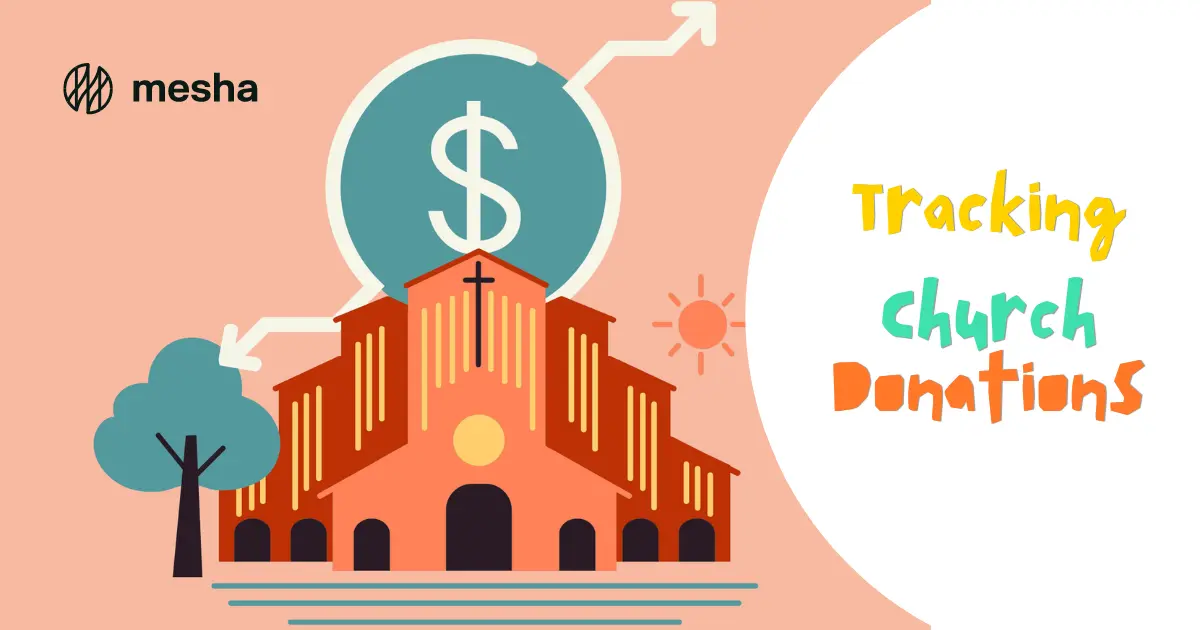Church Finances 101: How To Track Church Donations

Managing church finances can be a complex task. Accurate donation tracking is a crucial part of this process.
With the right techniques, you can ensure financial transparency and accountability. This not only builds trust within your congregation but also simplifies your financial management.
In this guide, we’ll explore various donation tracking techniques. From manual methods to advanced software solutions, we’ll cover a range of options suitable for churches of all sizes.
We’ll also delve into the features to look for in church donation tracking software. Plus, we’ll share best practices for maintaining donor privacy and data security.
Whether you’re a church administrator, treasurer, or a member of the finance committee, this guide will equip you with the knowledge to effectively track donations for your church. Let’s get started.
Understanding the Importance of Donation Tracking
Donation tracking is more than just keeping a record of funds received. It’s about ensuring financial transparency and accountability within your church community.

By accurately tracking donations, you can provide clear and detailed reports to your congregation. This fosters trust and encourages further giving. Moreover, it helps you meet legal requirements for tax purposes and enables effective financial planning for church projects. Understanding the importance of donation tracking is the first step towards better church financial management.
Manual Tracking vs. Software Solutions
When it comes to donation tracking, churches have traditionally relied on manual methods. These include spreadsheets, ledger books, and even simple pen and paper. While these methods can work, they are time-consuming and prone to errors.
- Manual methods require meticulous data entry and constant updating.
- They can be inefficient and lead to inaccuracies.
- Manual tracking is not scalable for growing churches.
The Basics of Manual Donation Tracking
Manual donation tracking involves recording each donation as it comes in. This could be in a ledger book or a spreadsheet. The key is to capture essential details like the donor’s name, donation amount, and date.
While this method is straightforward, it can be labor-intensive. Especially when dealing with a large number of donations. It also leaves room for human error, which can lead to inaccuracies in your financial records.
Embracing Church Donation Tracking Software
On the other hand, church donation tracking software can simplify and automate the process. It reduces the time spent on data entry and minimizes the risk of errors. This software can also provide valuable insights through reporting and analytics.
With the right software, you can track donations, categorize funds, and generate reports with ease. It also allows for better donor management, offering a seamless giving experience for your congregation. Embracing technology in this way can significantly improve your church’s financial management.
Key Features of Church Donation Tracking Software
When choosing a church donation tracking software, there are several key features to consider. These features can greatly enhance the efficiency and accuracy of your donation tracking process.
- Ease of use: The software should be user-friendly, with a clear and intuitive interface.
- Reporting capabilities: It should offer comprehensive reporting features to help you analyze donation trends and patterns.
- Integration: The software should integrate seamlessly with your other financial systems, such as accounting software.
Integration with Financial Systems
Integration with other financial systems is a crucial feature of any good donation tracking software. This allows for a more streamlined and efficient financial management process.
When your donation tracking software integrates with your accounting system, for example, it eliminates the need for double data entry. This not only saves time but also reduces the risk of errors in your financial records.
Reporting and Analytics
Reporting and analytics are another key feature of donation tracking software. These tools can provide valuable insights into your donation trends and patterns.
With these insights, you can make data-driven decisions to improve your fundraising strategies. You can also use this data to communicate more effectively with your donors, showing them the impact of their contributions.
Why You Need a Bookkeeper to Help with Tracking Church Donations

Having a bookkeeper to assist with tracking church donations can bring several benefits to your financial management process:
- Expertise: A bookkeeper is trained in financial record-keeping and can ensure accurate and detailed tracking of donations.
- Efficiency: Bookkeepers can streamline the donation tracking process, saving time and reducing the risk of errors.
- Compliance: A bookkeeper can help ensure that your donation records meet legal requirements for tax purposes.
- Financial Insights: Bookkeepers can provide valuable insights through financial reports and analysis, helping you make informed decisions for your church projects.
- Data Security: Bookkeepers can help maintain donor privacy and data security by implementing secure data handling practices.
By having a bookkeeper dedicated to tracking church donations, you can enhance transparency, accountability, and efficiency in managing your church finances.
Best Practices for Accurate Donation Tracking
Accurate donation tracking is crucial for maintaining financial transparency and accountability in your church. It helps ensure that all donations are properly recorded and allocated.
Here are some best practices for accurate donation tracking:
- Regularly review and update your donation records.
- Categorize donations and track restricted funds separately.
- Ensure donor privacy and data security.
- Provide donors with tax-deductible receipts.
- Conduct regular audits of donation records.
Categorizing Donations and Funds
Categorizing donations and tracking restricted funds separately is a key aspect of accurate donation tracking. This helps ensure that funds are used as intended by the donor.
For example, if a donor specifies that their donation should be used for a specific project, this should be recorded and tracked separately. This ensures that the donation is allocated correctly and provides transparency to the donor.
Ensuring Donor Privacy and Data Security
Ensuring donor privacy and data security is another crucial aspect of donation tracking. Donors need to trust that their personal information and donation data are safe.
This involves implementing secure data handling practices and using secure software for donation tracking. Regular audits can also help identify any potential security risks and ensure that all data is handled in compliance with privacy laws and regulations.
Training and Support for Your Team
Training your team on donation tracking procedures and software is essential for effective donation management. This includes both staff and volunteers who handle donations.
Support should also be provided to help your team navigate any challenges they may face. This could involve regular training sessions, access to resources, or a dedicated support team. Ensuring your team is confident and competent in donation tracking will contribute to the overall financial health of your church.
Engaging Your Church Community Through Transparency
Transparent tracking and reporting of donations can help engage your church community. When members see where their donations are going, they are more likely to feel connected and invested in the church’s mission.
Moreover, transparency fosters trust and builds stronger relationships within the church community. It reassures donors that their contributions are being used responsibly and for the intended purposes.
FAQs on Church Donation Tracking
Donation tracking is a crucial aspect of managing church finances. However, it can raise several questions, especially for those new to the process. Here are some common queries and their answers.
How can we ensure the security of our donation data?
Ensuring the security of donation data is paramount. Choose a donation tracking software that offers robust security features. This includes data encryption, secure user access controls, and regular security updates.
What are the benefits of using church donation tracking software?
Church donation tracking software can simplify and automate the process of tracking donations. It can save time, reduce errors, and provide valuable insights through reporting and analytics.
Can small churches benefit from donation tracking software?
Absolutely. Many donation tracking software options are scalable, making them suitable for churches of all sizes. They can help small churches manage their finances more efficiently and prepare for growth.
How often should we report on church finances to our congregation?
Regular financial reporting is essential for transparency. The frequency can vary, but many churches find a quarterly or monthly report to be effective. This keeps the congregation informed and engaged in the church’s financial health.


